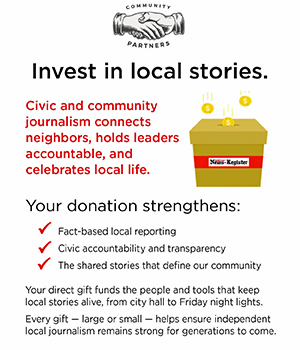Let's make government boring again
Not quite 30 years ago, I stood in a well-worn conference room at an obscure Naval base, raised my right hand, and swore to defend the Constitution.
With some variations — the civil and military oaths differ slightly — I have repeated those words at least a dozen times during my life. And it never ceases to humble me.
Back then, I was just a college student interning in a contracting office.
The job itself wasn’t terribly glamorous. Mostly, I rode a bicycle around base making sure contractors were on task and on target.
Yet even as a 20-year old, I felt part of something bigger. In my own small way, I was helping ensure taxpayers got their money’s worth.
That meant a lot to me, and I worked very hard at it. I could do nothing less.
Working for the government gets a bad rap, I know. But in a very real sense, the Department of the Navy is my ‘family’ business.
My great-grandfather went to work in the Bremerton Navy Yard shortly before the First World War, and my Dad retired from there as I graduated from college. Across the nine intervening decades, my family produced countless "Yard Birds."
So on that first day, standing in that conference room — in a building my great-uncles actually built — I very much felt my family’s history on my shoulders. I knew I was the latest in a proud line, and with that came expectations.
Chief among those was "professionalism," shorthand for the idea that we were not simply above politics, but beyond them. No matter who occupied the White House or led the Congress, we would keep the fleet at sea.
End. Of. Story.
That commitment’s a big deal.
At the heart of the civil service is a balance. Elected officials set policy while civil servants enact it. One side has authority, the other responsibility.
All jokes about government employees aside — and trust me, I’ve heard them all and repeated a few myself — most civil servants pride themselves on their jobs and tackle their work with a very real sense of mission. Indeed, my 20-plus year career as an economist, partnering with a slew of agencies, ranging from the Bureau of Reclamation to the Bureau of Indian Affairs, leaves me in awe of just how good most civil servants are.
I've found the economists employed by the Forest Service and Department of Agriculture particularly impressive — better than those at a lot of universities, in fact.
The existence of an apolitical career bureaucracy is both a symbol and signal of a mature democracy. It reflects the value the elected politicians who lead the nation assign to the expertise and service of the bureaucrats who execute the nations’ business.
Ironically, this has become such a feature of American life that we are conditioned to governmental competence. We EXPECT government not only to work, but to work well.
That’s bent and broken lately, particularly over the last year. We have seen too many cases where the government agencies we expected to do our work manifestly failed at their jobs.
From the Centers for Disease Control botching the roll-out of COVID 19 tests to the Occupational Health and Safety Administration watering down protections for workers in meatpacking plants, our bureaucracy has not done what we needed it to do. As a result, people, real people, have suffered.
Closer examination of these failures, though, reveals one thing in common: It wasn’t the frontline workers who blew it. In nearly all cases, it was intervention by political appointees in the daily operations of the agencies in question — intervention that undermined the technical expertise of the agencies involved.
That’s not the way the system is designed to work. It blurred the lines between authority and responsibility, thus striking at the very professionalism of the civil service. The old "Yard Bird" in me watched in horror.
So as we look forward across the next four years, my personal hopes are fairly modest.
We need to restore the balance between politicians and the public agencies that do America’s work. We need to return to our century-old tradition of valuing and respecting the professionalism of our civil service as we ask them to perform its various missions. In short, we need to make government boring again.
CUTLINE













Comments